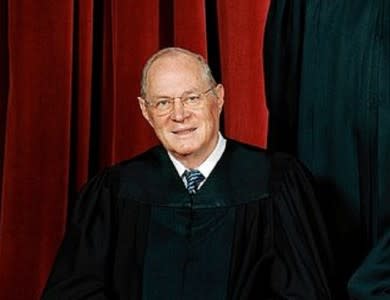Hobby Lobby headlines remaining Supreme Court decisions
More Supreme Court decisions are expected on Thursday and next Monday, with an imminent ruling in the Hobby Lobby case grabbing the most attention because of its direct impact on the Affordable Care Act, or Obamacare.
On Wednesday, the Court handed down sweeping decisions in the Aereo and cellphone privacy cases. The Court effectively shut down Aereo as a business when it found that Aereo infringed on copyrights held by TV networks. And a unanimous Court ruled that police must get a warrant to search any cellphone impounded after an arrest.
Hobby Lobby now remains as the most prominent case left undecided by the Court.
Justice Anthony Kennedy
The Court is actually considering two cases that are linked together. In the case of Hobby Lobby Stores v. Sebelius, Hobby Lobby, a craft store chain, and its sister company, Mardel Christian bookstore, want an exemption from a ACA requirement that it provide insurance coverage for morning-after pills and similar emergency birth control methods and devices.
The second case is Conestoga Wood Specialties Corp. v. Health and Human Services Department. Conestoga is a Mennonite family-owned, profit-making business, and it claims that the ACA’s birth control mandate violates the company’s rights under the First Amendment and the federal Religious Freedom Restoration Act. The Third Circuit rejected that argument.
The two cases represent a lot of constitutional issues and touch on other pending cases in the legal pipeline. When the cases were heard at the Court in March, at least 73 other legal challenges were being mounted to parts of the ACA that allegedly violated religious beliefs.
In March, the nine Justices heard about 90 minutes of arguments in the two cases from two familiar names: Solicitor General Donald Verrilli and Paul Clement. Both men argued before the Court in 2012 about the Affordable Care Act.
There were indications during the arguments that Associate Justice Anthony Kennedy could be a factor in the final decision, after Kennedy joined both the Court’s liberals and conservatives in posing questions to Verrilli and Clement.
Reporters from The Wall Street Journal, who were at the arguments, also believed that Chief Justice John Roberts might have been seeking a compromise involving closely held companies (like Hobby Lobby) and publicly held companies.
Constitution Daily contributor Lyle Denniston, writing a detailed analysis for the blog in March, also said that Kennedy could be a factor in the decision.
“One impression that Kennedy left very strongly on Tuesday was that, as is often true for him, he would rather the Court not stray too far beyond what it has to decide to get a result in the specific dispute up for decision,” Denniston said. “If a decision raises sequel questions, there will be time enough to reach them when they actually arise. That, of course, was the approach he took last June on the same-sex marriage issue, deciding no more than seemed necessary at the time, but generating a host of follow-up disputes that lower courts confront, in the first instance.”
The Hobby Lobby and Conestoga Woods cases have also been frequently discussed at National Constitution Center programs and on our We The People podcasts.
Alan Dershowitz, at an event here just after the Supreme Court arguments, told us that he believed the Supreme Court would decide the Hobby Lobby case on narrow grounds, and that closely held corporations with religious beliefs would benefit from the ruling, but not publicly owned companies.
Ilya Shapiro from the Cato Institute and David Gans from the Constitutional Accountability Center also discussed Hobby Lobby in a podcast with National Constitution Center president and CEO Jeffrey Rosen.
Both Shapiro and Gans pointed to Kennedy as a key factor in the final decision.
“Judging by Justice Kennedy’s questions towards the close of the argument, it didn’t seem that he would be convinced by the argument that corporations shouldn’t have free exercise rights,” Gans said. But he also believed that Kennedy would factor in the argument that employers can’t impose religious beliefs on employees.
“Kennedy is harder to predict than the Court as a whole,” said Shapiro, who expected a narrow decision in a way that Chief Justice Roberts liked. He also called the potential decision “very important for religious liberty.”
Recent Stories on Constitution Daily
Supreme Court rules that Aereo is illegal
Supreme Court issues historic ruling to protect your cellphone rights
Video: Lawyers who argued Riley cellphone case at the National Constitution Center


